
Background information
Valve gets in touch with Valais-based game developer upon his successful demo
by Philipp Rüegg

Nightdive brings old games back to life, with its latest project being Lucas Arts’ western shooter Outlaws. Although the studio’s work is just a drop in the ocean, it doesn’t believe in forcing the preservation of games.
Nightdive was born out of necessity. Stephen Kick, a Sony veteran who’d worked on Planetside back in 2003, was in the mood to play cult sci-fi game System Shock 2. Unfortunately, he realised his original copy was incompatible with modern systems. Searches for a digital version on Steam and other platforms proved fruitless. As a result, Kick took matters into his own hands and founded Nightdive.
Over the 13 years that followed, the studio didn’t just completely remaster and re-release both System Shock games. It also brought numerous other classics back to life, including Doom, Hexen, Turok 2 and Star Wars: Dark Forces. In 2023, the company was acquired by Atari, which has been increasing its focus on all things retro.
Nightdive’s latest project is Outlaws, a 1997 game that’s been given a contemporary makeover with enhancements including 4K resolution, 120 fps and modern controller compatibility. The remaster of Lucas Arts’ Wild West first-person shooter was unveiled at this year’s Gamescom.
It’s too late for the majority of games to get a remaster like this. According to this study, almost 90 per cent of games released before 2010 have already been lost. Nightdive has stepped up to become one of the leading studios bucking this trend. As far as game historian Frank Cifaldi’s concerned, however, it’s piracy and emulation that have contributed most to game preservation.
At Gamescom, I met up with Nightdive’s Director of Business Development, Larry Kuperman. We chatted about game restoration, the Stop Killing Games initiative and why he doesn’t see piracy as a legitimate game preservation method.
What do you think of piracy as a way of preserving games?
Larry Kuperman, Nightdive Studios: I know there are developers who say, «I’d rather you pirate my game than buy it from a website that won’t pay me,» but I think that’s risky. I understand why developers feel that way, but someone who’d pirate their game would probably pirate mine too, and I find that unacceptable.
Games being lost is a huge problem. Imagine if the British Museum or the Louvre burnt down and 75 per cent of the artworks were lost. We’d all agree that would be a disaster, but the idea of the same thing happening to video games is generally met with indifference.
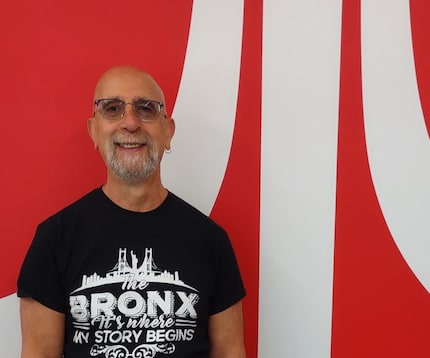
What legal alternatives are there in addition to what Nightdive does?
I’ve talked to GOG about continually reminding companies to document and retain everything, even simple notes on a napkin. If we don’t have an understanding of how a game was created, it’s difficult to know what direction to take with it. Our sister company Digital Eclipse is also doing excellent work with its interactive museum games. It recently launched Mortal Kombat: Legacy Collection and is a curator at the Strong Nation Museum of Play.
What do you make of the Stop Killing Games initiative?
I think it’s a good thing that the issue’s being addressed. On the flipside, we have to be aware of the possible consequences. If a game’s mine, I have the right to say that it’s over. Nobody can force me to support a game I developed until the day that I die.
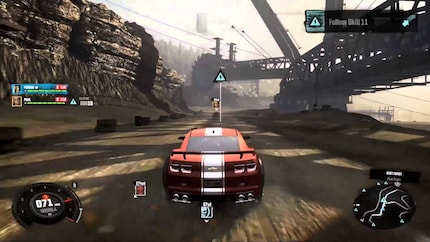
But shouldn’t there be a way for people who’ve paid for a game to always be able to play it somehow?
That’d definitely be a great thing. The only question is: how could we achieve it?
I think you can prevent games from disappearing by creating an incentive for them not to disappear.
Maybe that’s a question of tax relief, I don’t know. I don’t want games to disappear – that’s why I need the source code so that I can do my job.
How do you choose which game to re-release?
We just felt like doing Dark Forces. It made sense to complement it with Outlaws because both games are based on the same engine. When it comes to choosing games to work on, we basically have three criteria. The first is whether the game was popular. I didn’t need to think twice when I was asked to remaster Doom and Quake. Then there are games that weren’t necessarily popular, but made a big impact.
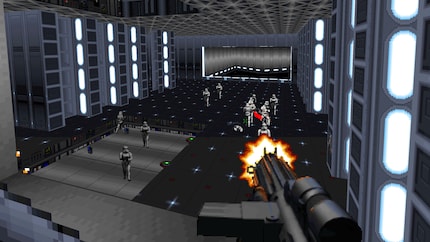
Outlaws established two mechanics we take for granted in this day and age – manual reloading and a magnification function for guns – and these innovations deserve historical recognition. Plus, it’s a Lucas Arts title, and those are always worth remembering. Aside from those two criteria, we have important personal reasons for remastering games.
Could you give me an example?
We redeveloped a fairly unknown game called PO’ed as a birthday present to its developer Sam «Kaiser» Villarreal, the genius behind the Kex engine (editor’s note: Nightdive’s software for modernising old games). Many people share personal stories with us. A game might hold special significance for them, often because they’re connected to personal experiences or memories of dead relatives. Even unknown titles are very meaningful to some people.
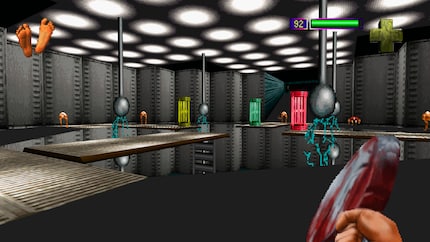
How complicated is the whole ownership rights situation?
Figuring out ownership rights can be a huge sticking point, especially since old contracts often only exist in paper form. It’s often unclear where they are and how many there are. These uncertainties make it difficult for us to work on certain titles we’d like to re-release.
Is one of them No One Lives Forever?
Do I really have to name names? It’s a brilliant game series with an intelligent, clever female main character.
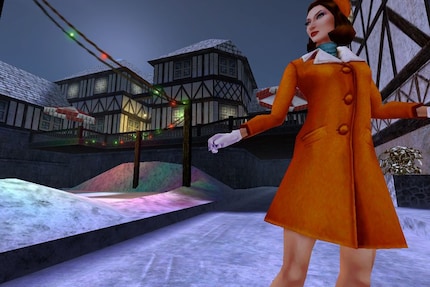
What’s the most difficult thing about re-releasing an old game?
It’s always a challenge, but we have a simple motto that sums up our goal:
I’ve played your remastered editions of Hexen and Heretic. The music is an interesting component. Although the new sound is fantastic, it didn’t fill me with the nostalgia I was hoping for – not like the original MIDI music does. How do you manage the balancing act between preserving the original and making changes?
We try to offer players multiple options whenever possible. Back in 2015 with Turok, we created options to play with or without fog of war. In additional, we always explain why a particular development decision was made for the original game. For instance, the fog was only implemented because of the Nintendo 64’s limitations. It’s a balancing act between achieving that sense of musical nostalgia for long-time fans and having new players accept the game.
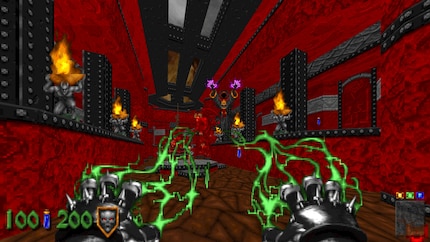
How do you approach remasters like that?
We always start with the source code. If we can, we reach out to the original developers. That’s turned out to have been really valuable. When we were working on The Thing, we managed to recruit two members of the original art team, Ron Ashtiani and Mark Atkinson.
How does importing the game to your Kex engine work?
First, we analyse the source code and reconstruct its functionality. After that, we look for the assets. We take a unique approach to doing that, namely comparing the assets of the PC version with those of other platforms, such as the N64, to find any differences or additional content. We then bring these together to create a product that’s as complete and definitive as possible.
How do you improve low-resolution textures?
We use upscaling technologies to increase the resolution. As I mentioned before, we often combine assets from different console versions. For Doom 64, our first project for id Software, we reconstructed the most authentic version of the game using a variety of sources. Working closely with the original developers, we discovered two incomplete levels of Shadow Man that never made it into the game because the studio had run out of time and money. We, on the other hand, had the time and the assets. That means our version of Shadow Man isn’t just the most complete – it’s also the most authentic.
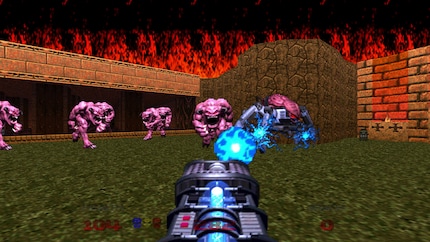
You’ve already revealed what your next dream retro project would be. Would you also like to develop your own game?
We’ve talked about it, but we’re not ready yet. There are still a few obstacles to overcome, but we’re getting there.
As a child, I wasn't allowed to have any consoles. It was only with the arrival of the family's 486 PC that the magical world of gaming opened up to me. Today, I'm overcompensating accordingly. Only a lack of time and money prevents me from trying out every game there is and decorating my shelf with rare retro consoles.
Interesting facts about products, behind-the-scenes looks at manufacturers and deep-dives on interesting people.
Show all
Background information
by Philipp Rüegg

Background information
by Domagoj Belancic

Background information
by Debora Pape